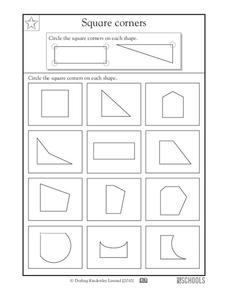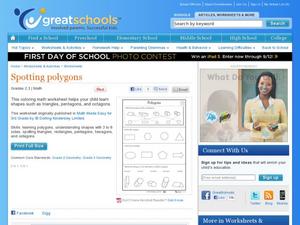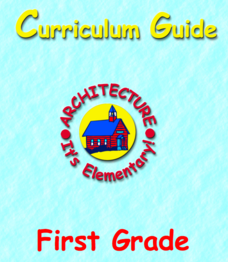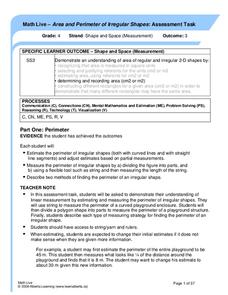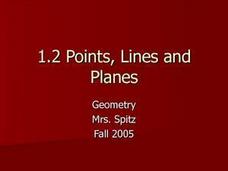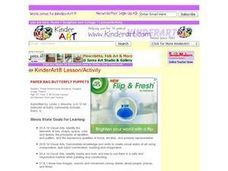Curated OER
Area of 2D Shapes Homework
In this geometry worksheet, students solve the area of 2D shapes starting with squares, rectangles, parallelograms, triangles, rhombi, trapezoids, circles, and ending with area of shaded regions. There are 20 questions.
Curated OER
Making Two-Dimensional Shapes
Use this introductory geometry worksheet as a projected warm-up for your class, doing it together and then revealing the explanation on the bottom half. Learners examine a square and a circle, each bisected by a dotted line. They must...
Curated OER
Shapes
Discuss the properties of 2D and 3D shapes in order to help learners understand the concept. Learners will participate in an interactive whiteboard lesson to develop understanding of 2D and 3D shapes.
Curated OER
3-D Diorama
Students view examples of 3-D art. The teacher demonstrates folding paper in half, cutting out shapes, and gluing 3-D figures onto the diorama. Students create their own diorama. Student dioramas are displayed for review and critique.
Curated OER
Properties of Polygons, Same-Length Sides
Can your third graders spot the differences between these geometric shapes? After studying several sections of triangles, rectangles, and other polygons, learners circle the shape described in each set of instructions. For extra...
Curated OER
Properties of Polygons, Parallel Sides, and Right Angles
Have fun with shapes! Third graders read a set of instructions and circle the shape in the description. They work on recognizing parallel sides and right sides. Use this resource as homework after your geometry lesson.
Curated OER
Lesson 9-3 Practice A: Composite Figures
In this composite figures worksheet, students solve twelve short answer problems. Students find the area of figures composed of various polygons given a sketch of the figure with side lengths labeled.
Curated OER
What's in the Bag?
Help your students identify the attributes of two-dimensional shapes. They read the book Round is a Mooncake, and use pattern blocks to sort shapes. Students sort shapes according to their attributes.
Curated OER
Square Corners
Which ones are square corners? As they learn more about shape attributes, be sure scholars understand the difference between a vertex and a square corner. After examining two examples, learners circle the 90-degree corners in 12...
Curated OER
Spotting Polygons
See all sides of the story with a worksheet on geometric shapes! After studying the example at the top, which matches polygons with solid figures, second graders circle shapes that are named in the directions. Next, they match polygons...
American Institute of Architects
Architecture: It's Elementary!—First Grade
Build an interest and appreciation for architecture in your young learners with this fun 10-lesson art unit. Engaging children in using their five senses, the class first observes the environment around them, paying...
Curated OER
Dihedral Figures
Middle and high schoolers perform transformations. In this web based lesson, students explore dihedral figures. They use the web tools to translate, rotate, and reflect figures. Pupils identify lines of symmetry.
Freecloud Design
Mathmateer
Three, two, one...liftoff! Elevate math skills to new heights while having a blast. A great resource that combines entertainment and education for children of all ages.
Alberta Learning
Area and Perimeter of Irregular Shapes
Evaluate young mathematicians' understanding of area and perimeter with this series of three assessment tasks. Challenging students to not only calculate the area and perimeter of irregular shapes, but to explain in writing their...
Radford University
Coal Silo Design Task
The coal is mined. Now what? Scholars design a coal silo that stores mined earth using at least two different three-dimensional shapes. They calculate the volume, determine the amount of mined earth produced in a day, and find the amount...
Curated OER
Shapes and Their Insides
Learners follow a series of instructions for drawing and coloring different shapes in order to learn the difference between the perimeter and area of a polygon. Then they are asked to find the perimeter and area of a 3x4 rectangular...
Curated OER
Geometry and Rubik's Cube
High schoolers explore geometry using a Rubik's Cube. In this 2-D and 3-D shapes lesson, students use the Rubik's Cube to find the center, edge and corner pieces. High schoolers then find the dimensions of the Rubik's Cube and read the...
Curated OER
1.2 Points, Lines and Planes
This is a lengthy overview PowerPoint that defines, explains, shows examples, and has practice problems about points, lines and planes. The class will need to write many notes and there is an example of how to set up in the Cornell...
Curated OER
Measurement: 2D and 3D
Students solve volume problems. In this geometry lesson, the class watches a video about clean water (link provided) and individuals compare the volume of different prisms, including an actual drinking glass. Extension activities include...
Willow Tree
Patterns - Numbers, Shapes, etc.
Find the pattern is the name of the game! Learners examine different patterns represented by numbers, shapes, and words. They must describe the pattern, predict the result in a given position, and find an equation that...
Curated OER
Year 5 Unit 2b
This slide-show is packed with information relating to a variety of mathematical concepts. Intended as an accompaniment to a full unit, this resource provides definitions, explanations, and opportunities for learners to practice their...
Curated OER
Paper Bag Butterfly Puppets
Whether you're using it to tell stories, explore the letter b, or during a life science lesson plan, these butterfly puppets will be a hit. Youngsters use crayons, tissue paper, and paper bags to create butterfly puppets.
One Billion
Math, Age 3-5
Jump start children's math education with this fun basic skills resource. Offering dozens of different touch-and-swipe activities with colorful graphics, this program is perfect for all young learners.
Curated OER
Tiling Tessellations
Students explore tessellations. In this shapes and geometry lesson, students describe the attributes of many of the shapes displayed on an Elmo. Students create examples of tessellations using pattern blocks.








